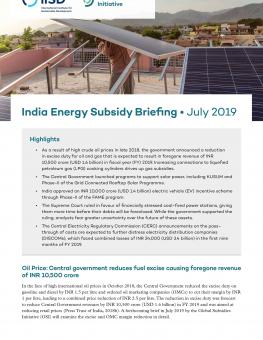
India Energy Subsidy Briefing July 2019
As part of its work on energy policy and sustainable development in India, the Global Subsidies Initiative publishes a regular briefing on issues related to energy subsidies.
As part of its work on energy policy and sustainable development in India, the Global Subsidies Initiative publishes a regular briefing on issues related to energy subsidies.
Below are highlights from the July 2019 edition:
- As a result of high crude oil prices in late 2018, the government announced a reduction in excise duty for oil and gas that is expected to result in foregone revenue of INR 10,500 crore (USD 1.6 billion) in fiscal year (FY) 2019. Increasing connections to liquefied petroleum gas (LPG) cooking cylinders drives up gas subsidies.
- The Central Government launched programs to support solar power, including KUSUM and Phase-II of the Grid Connected Rooftop Solar Programme.
- India approved an INR 10,000 crore (USD 1.4 billion) electric vehicle (EV) incentive scheme through Phase-II of the FAME program.
- The Supreme Court ruled in favour of financially stressed coal-fired power stations, giving them more time before their debts will be foreclosed. While the government supported the ruling, analysts fear greater uncertainty over the future of these assets.
- The Central Electricity Regulatory Commission (CERC) announcements on the passthrough of costs are expected to further distress electricity distribution companies (DISCOMs), which faced combined losses of INR 24,000 (USD 3.4 billion) in the first nine months of FY 2019.
For any additional or more detailed information, please do not hesitate to contact Christopher Beaton or Vibhuti Garg.
You might also be interested in
India Faces Clean Energy Challenges as Energy Demand Soars and Global Fossil Fuel Subsidies Rise
New research finds the global energy crisis and increasing energy demand have pushed India's energy subsidies to a 9-year high.
G20 energy ministers call for cooperation on nuclear energy & low-emission hydrogen
The Group of 20 energy ministers' meeting concluded in Goa on July 22, 2023, with the final summary failing to include language on the phase-down of unabated fossil fuels.
Implementing Solar Irrigation Sustainably
This guidebook provides recommendations to state policy-makers on how they can implement solar irrigation models, particularly decentralized solar plants for irrigation under the PM-KUSUM scheme, effectively and sustainably.
The United Kingdom, New Zealand, and Colombia Join Coalition to Phase Out Fossil Fuel Subsidies
Today on the sidelines of the UN Climate Conference in Baku (COP 29), the United Kingdom, New Zealand, and Colombia joined the international Coalition on Phasing Out Fossil Fuel Incentives Including Subsidies (COFFIS).